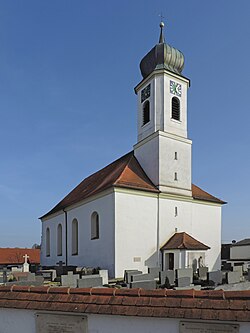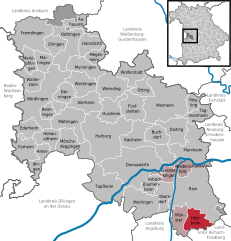Holzheim | |
|---|---|
 Church of the Assumption of the Virgin Mary | |
Location of Holzheim within Donau-Ries district  | |
| Coordinates: 48°37′N10°58′E / 48.617°N 10.967°E | |
| Country | Germany |
| State | Bavaria |
| Admin. region | Schwaben |
| District | Donau-Ries |
| Government | |
| • Mayor (2020–26) | Josef Schmidberger [1] (CSU) |
| Area | |
• Total | 19.62 km2 (7.58 sq mi) |
| Highest elevation | 475 m (1,558 ft) |
| Lowest elevation | 414 m (1,358 ft) |
| Population (2023-12-31) [2] | |
• Total | 1,198 |
| • Density | 61/km2 (160/sq mi) |
| Time zone | UTC+01:00 (CET) |
| • Summer (DST) | UTC+02:00 (CEST) |
| Postal codes | 86684 |
| Dialling codes | 08276 |
| Vehicle registration | DON |
| Website | www.gemeinde-holzheim.de |
Holzheim is a municipality in the district of Donau-Ries in Bavaria in Germany.
The community had 1,012 inhabitants in 1970, 1,006 in 1987, and 1,145 in 2000.



